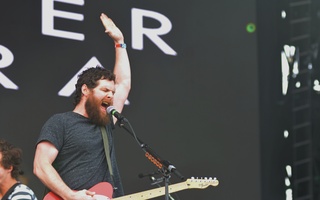{shortcode-095fcd1fd4bfc76d599d78e1d6bf54aa878228e6}
Three years ago, the “Frozen” soundtrack captured hearts across the world. In addition to contributing to the soundtrack, the up-and-coming composer Leo B. Birenberg has worked on numerous films, including “Edge of Tomorrow,” “Ant-Man,” and “The Peanuts Movie,” and has scored TV series such as “Sing It!,” “Take My Wife,” and “Son of Zorn.” The Harvard Crimson sat down with Birenberg to talk about his work and influences.
The Harvard Crimson: How did you get in the cinematic music industry?
Leo B. Birenberg: That was always, like, my dream job. When I was little, I just wanted to be a little Steven Spielberg and direct movies. I used to make them with friends on, like, first generation iMovie. And then I became a band nerd extraordinaire—I played the saxophone and clarinet and flute throughout junior high and high school, and that was my passion. I decided to go to NYU to study music composition. I showed up on the first day, and my new roommate, who became my best friend, was studying film, and we were like, “We should collaborate on something!” and suddenly it became apparent that’s how I [could] combine everything I want[ed] to do: music, which is clearly my paintbrush in the artistic world, and my love of film from my childhood.
Then I did this program at USC called Thornton, [where I studied] scoring for music and television. It’s one of the few programs that kind of focuses on that because it’s grounded in LA and has a lot of interactions with the film industry. And then I was introduced to my main mentor, Christophe Beck, who needed an assistant around the same time that I finished at USC. So I started working with him and then worked with him for about five years, which was on and off, and that’s basically where I learned how to score movies. We worked on everything—”Frozen,” “Ant Man,” “Red Army”—you know, this whole range of genres, and so he really taught me a lot. And then eventually some guys I know made a TV show for Comedy Central, and I started doing that, which opened up a lot of opportunities to do my own stuff.
THC: What are some major influences for your work?
LBB: Depends on the project. I like movies; I like TV…. My background musically is kind of orchestral, jazz, musical theater; that’s what I grew up doing. I listen to freaking everything under the sun—bluegrass, Taylor Swift, literally everything. For me it’s fun to just tackle any genre.
THC: What are some of the ways you think music affects a film? What do you strive to do with your music?
LBB: I always think the most important service that music provides to a… film is just how it subconsciously connects with the audience but while they’re watching it. So you always have to keep in mind: “What is the emotion of this scene?” Is it funny? It might be emotionally sad; it might be nostalgic. You have to be constantly attuned to how you’re trying to make the viewers feel. Because if you lack that, you’re going to mess up the effect of the film or show. Everything won’t play the way it should.
THC: Have you considered scoring outside of Hollywood?
LBB: Oh sure, absolutely. I mean, I’m very interested in musical theater both on Broadway and in opera. I think I would love to do something in that realm. One thing about writing for film is that from a composer’s point of view it gives you a lot of music to write, but you are always servicing a greater good. Like, you are writing for film, and it’s a collaborative experience, but sometimes it’d be nice to just be able to write music where the only limits on what you create are whatever limitations you decide to apply to that project. I love writing choir music specifically, and if I ever have some downtime in the near future I will probably write some choir music. I love folky hybrid music—I’m very interested in Celtic folky music. I actually play penny whistle and low whistle. When I have free time I kind of find other small musical outlets like that, but nothing too large scale yet.
Read more in Arts
Artist Spotlight: 'Through the Woods' with Dan WakefieldRecommended Articles
-
 Artist Spotlight: Sam Wu '17
Artist Spotlight: Sam Wu '17 -
 Artist Spotlight: Duncan Rock
Artist Spotlight: Duncan Rock -
 Alumni Spotlight: Danny Troob '70
Alumni Spotlight: Danny Troob '70 -
‘Song to Song’ Familiar and OverlongTerrence Malick’s “Song to Song” opens with what seems like a trailer for the rest of the film, yet the two hours that follow introduce little more in narrative content or character development.
-
 From Boston Calling 2018: Saturday Sound Bites
From Boston Calling 2018: Saturday Sound Bites













